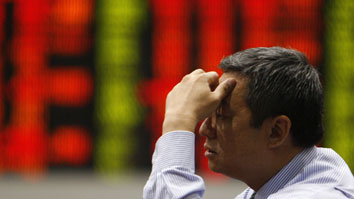Into the land of the unknown
еүҚйҖ”жңӘеҚң
Global market turmoil continues after the rejection of the mortgage-rescue plan in America
зҫҺеӣҪж•‘еёӮи®ЎеҲ’йҒӯжӢ’еҗҺе…ЁзҗғеёӮеңә继з»ӯж··д№ұ
HOW many votes in Congress will the latest financial upheaval change? That is the calculus underway in Washington, DC, after the House of Representatives defeated the proposed $700 billion mortgage-rescue plan by 228 to 205 on Monday September 29th. Democrats backed it by 140 votes to 95, while Republicans opposed it by 133 to 65.
жңҖиҝ‘зҡ„йҮ‘иһҚе·ЁеҸҳе°Ҷж”№еҸҳеӨҡе°‘еӣҪдјҡзҡ„йҖүзҘЁ?иҝҷжҳҜ继9жңҲ29ж—Ҙе‘ЁдёҖдј—и®®йҷўд»Ҙ228зҘЁеҸҚеҜ№пјҡ205зҘЁж”ҜжҢҒжҢ«иҙҘ7000дәҝзҫҺе…ғж•‘еёӮи®ЎеҲ’д№ӢеҗҺпјҢеҚҺзӣӣйЎҝжӯЈеңЁиҝӣиЎҢзҡ„и®Ўз®—гҖӮеҜ№жӯӨйЎ№ж•‘еёӮи®ЎеҲ’пјҢж°‘дё»е…ҡ140зҘЁж”ҜжҢҒпјҡ95зҘЁеҸҚеҜ№пјҢиҖҢе…ұе’Ңе…ҡеҲҷжҳҜ133зҘЁеҸҚеҜ№пјҡ65зҘЁж”ҜжҢҒгҖӮ
Bankers had been under no illusions that the tweaked Paulson plan would cure all the financial systemвҖҷs ills. But most had seen it as a step in the right direction, and had expected it to pass. Its rejection sent stockmarkets into freefall. The Dow Jones Industrial Average finished down by 7%, and suffered its biggest-ever points loss. Perhaps fittingly in an economy that is in danger of sliding into depression, the only stock among the 500 in the S&P index that finished higher was CampbellвҖҷs Soup. The S&P closed 29% below its peak. Reflecting fears that consumer demand will wilt, shares of Apple Computer, creator of the iPhone, fell by 18%. The rout continued in Asia and Europe on Tuesday morning.
银иЎҢ家们еҜ№еҰҘеҚҸеҗҺзҡ„йІҚе°”жЈ®зҡ„ж•‘еёӮи®ЎеҲ’дјҡжІ»ж„ҲйҮ‘иһҚзі»з»ҹзҡ„з–ҫжӮЈдёҚжҠұе№»жғігҖӮдҪҶжҳҜ他们дёӯзҡ„еӨ§еӨҡж•°и®ӨдёәиҜҘж•‘еёӮи®ЎеҲ’жҳҜеҫҖжӯЈзЎ®зҡ„ж–№еҗ‘еүҚиҝӣпјҢ并еёҢжңӣе®ғиғҪеӨҹеҫ—д»ҘйҖҡиҝҮгҖӮж•‘еёӮи®ЎеҲ’йҒӯжӢ’еј•иө·иӮЎеёӮйҮҚжҢ«гҖӮйҒ“зҗјж–Ҝе·Ҙдёҡе№іеқҮжҢҮж•°дёӢи·Ң7%пјҢеҲӣеҺҶеҸІжңҖеӨ§зӮ№ж•°и·Ңе№…гҖӮжҲ–и®ёпјҢеҜ№дёҖдёӘжңүзқҖж»‘еҗ‘иҗ§жқЎд№ӢеҚұйҷ©зҡ„з»ҸжөҺдҪ“жқҘиҜҙпјҢж ҮеҮҶжҷ®е°”500жҢҮж•°иӮЎзҘЁйҮҢ收зӣҳе”ҜдёҖдёҠж¶Ёзҡ„дёҖеҸӘиӮЎзҘЁжҳҜзҫҺеӣҪжұӨе“Ғз”ҹдә§е•ҶйҮ‘е®қжұӨпјҲCampbellвҖҷs Soupпјүе°ұжҳҜеҶҚе№іеёёдёҚиҝҮзҡ„дәӢжғ…дәҶгҖӮж ҮеҮҶжҷ®е°”500жҢҮж•°жҜ”е…¶еҺҶеҸІеі°еҖји·Ң29%收зӣҳгҖӮiPhoneејҖеҸ‘иҖ…иӢ№жһңе…¬еҸёзҡ„иӮЎзҘЁдёӢи·Ң18%,еҸҚжҳ еҮәеёӮеңәеҜ№ж¶Ҳиҙ№иҖ…йңҖжұӮе°ҶдјҡиҗҺзј©зҡ„жҒҗж…ҢгҖӮзҫҺеӣҪиӮЎеёӮ收зӣҳеҗҺ,дәҡжҙІиӮЎеёӮиҝҳеңЁдёӢжҢ«пјҢ欧жҙІиӮЎеёӮзҡ„дёӢжҢ«еҲҷ延з»ӯеҲ°е‘ЁдәҢж—©жҷЁгҖӮ
Worse, credit markets, already dysfunctional, were brought close to breaking point. Banks grew even less willing to lend to each other on Monday, and money-market funds fled anything with a whiff of risk. Some corporations are struggling to roll-over commercial paper, short-term debt issued to finance working capital, payroll payments and the like. In an effort to keep money markets from drying up, the Federal Reserve has doubled the size of a vital lending facility for banks, to $300 billion, and expanded agreements with other central banks that funnel dollars to lenders abroad.
жӣҙзіҹзҡ„жҳҜпјҢе·Із»ҸиҝҗиҪ¬дёҚиүҜзҡ„дҝЎиҙ·еёӮеңәжҝ’дёҙеҙ©жәғгҖӮе‘ЁдёҖпјҢ银иЎҢжӣҙдёәдёҚж„ҝдә’зӣёжӢҶеҖҹпјҢдёҖжңүйЈҺеҗ№иҚүеҠЁпјҢиҙ§еёҒеҹәйҮ‘е°ұеҮәйҖғд»»дҪ•жҠ•иө„йЎ№зӣ®гҖӮдёҖдәӣе…¬еҸёиӢҰиӢҰжҢЈжүҺдәҺз»“иҪ¬е•ҶдёҡзҘЁжҚ®пјҢеҸ‘иЎҢзҹӯжңҹеҖәеҲёжқҘзӯ№жҺӘжөҒеҠЁиө„йҮ‘пјҢж”Ҝд»ҳе·Ҙиө„е’Ңе…¶д»–иҙ№з”ЁгҖӮеңЁз»ҙжҢҒиҙ§еёҒеёӮеңәжөҒеҠЁжҖ§зҡ„еҠӘеҠӣдёӯпјҢзҫҺиҒ”еӮЁжҠҠдёҖйЎ№еҜ№й“¶иЎҢзҡ„е…ій”®иҙ·ж¬ҫдҫӣеә”规模зҝ»з•ӘпјҢиҫҫеҲ°3000дәҝзҫҺе…ғпјҢ并且延伸дәҶдёҺе…¶д»–еӨ®иЎҢе…ідәҺе®ғ们дёәеңЁжө·еӨ–з»ҸиҗҘзҡ„зҫҺеӣҪзҡ„银иЎҢжіЁиө„зҡ„еҚҸи®®гҖӮ
These unprecedented injections are aimed at easing concerns that weak participants in the interbank market will fail to honour their debts. But many banks are now assumed to be not only illiquid but insolvent. Last week Washington Mutual, a thrift saddled with rotten mortgages, became the largest-ever American lender to fail. And on Monday Citigroup agreed to buy most of the assets of Wachovia, an even bigger American bank, in a deal brokered by regulators. The pain has suddenly grown much more intense in Europe, too.
иҝҷдәӣз©әеүҚзҡ„жіЁиө„дёҫжҺӘзӣ®зҡ„еңЁдәҺзј“и§Јеҝ§иҷ‘пјҢиҝҷз§Қеҝ§иҷ‘жҳҜпјҡеӯұејұзҡ„еҸӮдёҺиҖ…еңЁеҗҢдёҡжӢҶеҖҹеёӮеңәдёҠж— иғҪеҠӣеҒҝиҝҳе…¶жүҖж¬ еҖәеҠЎгҖӮдҪҶжҳҜзҺ°еңЁи®ёеӨҡ银иЎҢиў«и®ӨдёәдёҚд»…д»…жҳҜжөҒеҠЁжҖ§е·®пјҢиҖҢдё”жҳҜж— еҒҝд»ҳиғҪеҠӣгҖӮдёҠе‘ЁпјҢдёҚе ӘжүҝеҸ—еӨ§йҮҸдёҚиүҜжҠөжҠјзҡ„дёҖ家еӮЁи“„银иЎҢвҖ“еҚҺзӣӣйЎҝдә’жғ 银иЎҢпјҲWashington Mutualпјүз ҙдә§пјҢжҲҗдёәзҫҺеӣҪжңүеҸІд»ҘжқҘжңҖеӨ§зҡ„еҖ’й—ӯ银иЎҢгҖӮе‘ЁдёҖиҠұж——йӣҶеӣўеҗҢж„Ҹиҙӯд№°еӨ§йғЁеҲҶзҫҺиҒ”пјҲWachoviaпјүиө„дә§пјҢзҫҺиҒ”жҳҜдёҖ家жҜ”еҚҺзӣӣйЎҝдә’жғ 银иЎҢ规模жӣҙеӨ§зҡ„银иЎҢпјҢжӯӨйЎ№дәӨжҳ“з”ұзӣ‘з®Ўж–№ж’®еҗҲгҖӮйҮ‘иһҚеҚұжңәзҡ„з—ӣжҘҡеңЁж¬§жҙІд№ҹжҖҘеү§еўһејәгҖӮ
The no vote was a big blow to George Bush, Hank Paulson, the treasury secretary, and Ben Bernanke, the Federal Reserve chairman. They gave dire warnings of the consequences of an unchecked crisis, in hopes of persuading Congress to approve an unusually aggressive and early fiscal intervention. (It took many more years for a systemic response to widespread failures of American savings and loan banks in the 1980s). But because the intervention is relatively early, voters have yet to see much impact from the crisis on their lives. вҖңOn Monday morningвҖҰthe sun came up and a lot of people went to work, and [they] couldnвҖҷt understand what this panic was in Washington,вҖқ Paul Kanjorski, a Democrat from Pennsylvania, told Mr Paulson last week. It was far easier for voters to relate to $700 billion of their taxes being spent on a mess in Wall Street.
еҜ№д№”жІ»•еёғд»ҖпјҢиҙўй•ҝжұүе…Ӣ•дҝқе°”жЈ®пјҢиҒ”еӮЁеҮәеёӯжң¬•дјҜеҚ—е…ӢиҖҢиЁҖпјҢеҗҰеҶізҘЁжҳҜдёҖеӨ§жү“еҮ»гҖӮ他们жӣҫеҜ№дёҚйҒҸеҲ¶еҚұжңәзҡ„еҗҺжһңз»ҷеҮәиӯҰе‘ҠпјҢеҜ„еёҢжңӣдәҺиҜҙжңҚеӣҪдјҡйҖҡиҝҮжӯӨйЎ№йқһжҜ”дёҖиҲ¬ең°з§ҜжһҒең°д№ҹжҳҜж—©жңҹең°иҙўж”ҝе№Ійў„гҖӮпјҲдёҠдё–зәӘ80е№ҙд»ЈпјҢеҜ№зҫҺеӣҪеӮЁи“„е’Ңиҙ·ж¬ҫ银иЎҢжҷ®йҒҚз ҙдә§зҡ„дёҖдёӘзі»з»ҹеҢ–еӨ„зҗҶиҖ—иҙ№дәҶи®ёеӨҡе№ҙпјүгҖӮдҪҶжҳҜеӣ дёәжӯӨж¬Ўе№Ійў„зӣёеҜ№иҰҒж—©пјҢйҖү民们没жңүж„ҸиҜҶеҲ°иҝҷеңәеҚұжңәеҜ№д»–们зҡ„з”ҹжҙ»зҡ„йҮҚеӨ§еҪұе“ҚгҖӮе®ҫеӨ•жі•е°јдәҡе·һж°‘дё»е…ҡдәәдҝқзҪ—В·еқҺд№”ж–ҜеҹәпјҲPaul KanjorskiпјүдёҠе‘ЁеҜ№дҝқе°”жЈ®иҜҙйҒ“пјҡвҖқе‘ЁдёҖжё…жҷЁвҖңвҖңвҖңеӨӘйҳіеҚҮиө·пјҢдәә们иө¶еҺ»дёҠзҸӯпјҢд»–д»¬ж— жі•зҗҶи§ЈеҚҺзӣӣйЎҝеңЁжҒҗж…Ңд»Җд№ҲгҖӮвҖқеҜ№йҖү民们жқҘиҜҙпјҢи®ӨеҗҢиҝҷ7000дәҝзҫҺе…ғвҖ“他们зәізҡ„зЁҺиў«жөӘиҙ№еңЁеҚҺе°”иЎ—зҡ„еәҹзү©дёҠеҖ’жҳҜжӣҙдёәиҪ»иҖҢжҳ“дёҫзҡ„дәӢжғ…гҖӮ
Party leaders largely agreed with the diagnosis, as did the presidential candidates of both parties. But polls showed that voters were split; constituent phone calls and e-mails ran heavily against the bill. Administration officials and party leaders are back at work trying to find a way to get at least 12 members to switch their vote; the betting both on Wall Street and in Washington, DC, is they will succeed. (Passage in the Senate is considered less problematic.) But it should not be taken for granted. Without amendments, anyone who changes his vote will face fierce criticism when he seeks re-election. Any amendments to appease Republicans could cost Democratic support, and vice-versa.
ж”ҝе…ҡйўҶ袖们еҫҲеӨ§зЁӢеәҰдёҠеҗҢж„ҸеҜ№жӯӨж¬ЎйҮ‘иһҚеҚұжңәзҡ„иҜҠж–ӯпјҢиҝһдёӨе…ҡзҡ„жҖ»з»ҹеҖҷйҖүдәәд№ҹиөһеҗҢгҖӮдҪҶжҳҜж°‘и°ғжҳҫзӨәдәҶйҖүж°‘з«Ӣеңәзҡ„еҲҶиЈӮпјҡеҸҚеҜ№ж•‘еёӮж–№жЎҲзҡ„жёёиҜҙз”өиҜқе’ҢйӮ®д»¶зә·жІ“иҮіжқҘгҖӮжү§ж”ҝе®ҳе‘ҳе’Ңж”ҝе…ҡйўҶиў–йҮҚж–°еӣһеҲ°жӯӨйЎ№е·ҘдҪңдёҠжқҘпјҢиҜ•еӣҫдҪҝиҮіе°‘12дёӘеҸҚеҜ№жҲҗе‘ҳж”№ејҰжҳ“иҫҷпјӣеҚҺзӣӣйЎҝе’ҢеҚҺе°”иЎ—йғҪ预计他们иғҪеӨҹеҠһеҲ°гҖӮпјҲеңЁеҸӮи®®йҷўйҖҡиҝҮй—®йўҳдёҚеӨ§пјүдҪҶиҝҷдёҚеә”еҪ“иў«зңӢдҪңжҳҜ他们е°ұ欣然жҺҘеҸ—гҖӮеҖҳиӢҘеҜ№иҜҘж–№жЎҲжңӘеҠ дҝ®и®ўпјҢд»»дҪ•дәәж”№еҸҳиҮӘе·ұеҺҹе…Ҳз«ӢеңәйғҪдјҡеңЁе…¶еҶҚж¬ЎйқўдёҙйҖүдёҫж—¶пјҲеҜ»жұӮиҝһд»»ж—¶пјүеҸ—еҲ°дёҘиӢӣзҡ„жү№иҜ„гҖӮеҸҰдёҖж–№йқўпјҢд»»дҪ•иҝҺеҗҲе…ұе’Ңе…ҡзҡ„дҝ®и®ўйғҪдјҡжҚҹиҖ—ж°‘дё»е…ҡзҡ„ж”ҜжҢҒпјҢеҸҚд№ӢдәҰ然гҖӮ












